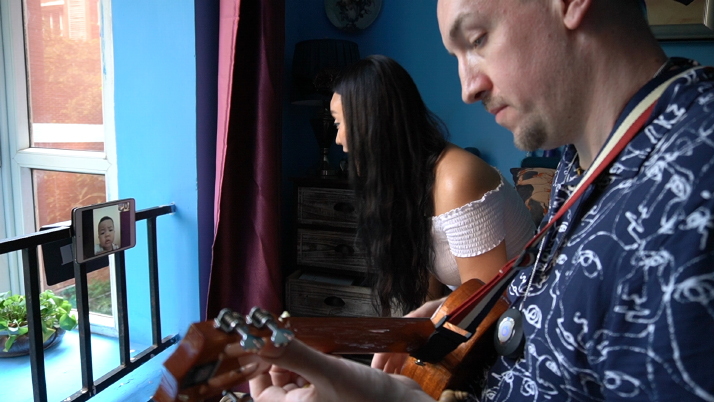| Lifestyle |
| A Canadian writer living in Chongqing shares his experience during days fighting against COVID-19 | |
|
|
|
|
|
"This week we globally race past 50 million novel coronavirus disease (COVID-19) cases. I feel lucky to be in China," Jorah Kai Wood, a 41-year-old writer from Canada living in Chongqing Municipality in southwest China, wrote in a blogpost in early November when containment measures against COVID-19 in the city were eased. Since the epidemic hit many regions across China months ago this year, keeping a diary has become part of his daily routine, with the stories published by New World Press as Kai's Diary: A Canadian's COVID-19 Days in Chongqing, China, in August.
Wood settled down in Chongqing in 2014 to teach at Chongqing Foreign Language School and married a local girl named Wang Xiaolin, in 2016. He is also an assistant editor at iChongqing, a Chongqing-based English website. In the diary, he describes his life in quarantine for some two months in Chongqing, recording the global COVID-19 situation and introducing effective anti-epidemic measures with a good dose of humor. "When the epidemic started, I wanted to get all my thoughts down, record them like a diary to get the anxiety and fear out of my mind. And eventually it became something I thought could help other people," he told Beijing Review.  Jorah Kai Wood and his wife Wang Xiaolin sing a song for her family via video link at home in Chongqing, southwest China, on August 10 (ZHANG WEI)
Wood posted the first entry on January 20, when Zhong Nanshan, head of a high-level expert team of China's National Health Commission, confirmed the human-to-human transmission of COVID-19. From then onward, he has published more than 60 articles and continued to post new entries on his blog and global websites including those of iChongqing and Canadian CTV, attracting media outlets and online readers across the world. Over 10,000 people left responses to his posts on Facebook.  English and Chinese versions of Jorah Kai Wood's diary (WANG XIANG)
Real-time recording In his diary, Wood recorded the epidemic situation in and beyond Chongqing earlier this year. According to the first diary entry on January 20, he had finished his work at the school at the end of last year and was ready to enjoy the Spring Festival holidays with his Chinese family. On that day, China reported 291 confirmed COVID-19 cases, including 270 in Hubei Province, central China, the hardest-hit region in all of China. Since Chongqing had reported zero cases until then, Wood felt as if the virus was some event taking place far away from his life and also noticed few residents wore masks when taking the subway. "News is going around about a bad cold or virus in Wuhan. My colleague and friend Parker tells me it might be a big deal, but it's worlds away from where I'm at," he wrote in the diary. However, the first confirmed case emerged in Chongqing on January 21 and that figure rose to 9 within two days. In the following days, Wood began to spot more people wearing masks in public places as the epidemic spread. He and his wife used to get together with her family over the Spring Festival holidays, but the epidemic reduced the number of family dinners from 10 to only two this year. The couple started self-isolating on January 25, severely limiting their time outside. Instead of going to Canada at that time, Wood chose to stay with his Chinese family, although he felt worried and helpless in quarantined life at first. As he wrote in the diary, he and his wife would put on masks and goggles before going out and take disinfection measures for around 20 minutes upon returning home. He became hyper-aware of the conditions of people around him in public places. The couple once met a hairdresser they knew on their way to a grocery store and found him not to be wearing a mask. "I'm never getting my hair cut there again," Wood wrote jokingly. However, his anxiety soon eased as the local government began to launch containment measures and he himself gradually adapted to the new lifestyle. "We are all worried, but we are hopeful. The measures taken by China are unheard of and will have a huge impact in breaking the chain of transmission if people can be patient and wait in their homes," he said in an entry. The diary recorded how medical workers from across China went to Hubei to help fight the virus and community workers remained at their posts to measure the body temperature of passersby and help people stay inside their homes by buying them daily supplies. Although many malls and restaurants were shut down, the continued supply of essentials was a relief to him. "The supply line did not break, and Chongqing took extraordinary measures to keep supermarkets well-stocked with fresh food." Besides updates on the global COVID-19 situation, Wood also shared the interesting times of life in quarantine. To cheer himself up, he would imagine himself to be an astronaut and his room a cabin, a safe base which he could return to after traveling outside. During this period, he taught online English courses, wrote his diary, and cooked meals as a daily routine. His wife also exercised by giving salsa classes, attracting a large online audience. As some of the people he knew outside China caught the virus, the diary also gave many anti-infection tips, including wearing a mask. Wood would sing Bohemian Rhapsody to ensure he washed his hands for at least 20 seconds. "We change some fundamental aspects of our behavior, and we can keep the virus at bay effectively," he wrote. After nearly two months of quarantine, the last COVID-19 patient in Chongqing was discharged from hospital after recovery on March 15, raising the total number of recovered patients to 570. According to the last entry on March 18, the couple went to their favorite noodle house and saw the city return to its old hustle and bustle, marking the end of their quarantined life. On March 19, the Chinese mainland reported zero increase of domestically transmitted COVID-19 cases. Wuhan reported no newly confirmed cases on the same day.  Jorah Kai Wood gives online English courses through an iPad at home in Chongqing, southwest China, on August 10 (ZHANG WEI)
A lighthouse in storms Wood's diary has commanded widespread attention. According to Myagi, a reader of the book, it is "a roadmap for how to survive what it looks like we are all, sadly, going to go through." The diary also touched many Chinese readers. A netizen from Chongqing named April left a message on his blog, saying that the posts provided her with a sense of comfort after she returned to the city from Australia in January. Many readers take the diary as a guideline in their struggle with the virus and the fear of infection. "My friend Jane told me that her 75-year-old mother's immune system had been compromised, and she lives in a small town. Because of my blog, they were able to get her three months of food, masks, and sanitizing products before everyone in her town shopped out everything," Wood said. He thinks the strong anti-epidemic measures taken in China have made it possible to target virus-hit areas and gain back control of the situation. According to his diary entry on November 21, the simple answer as to why China is 99.9 percent COVID-19-free is that it installed an eight-week hard lockdown to figure out who were sick and trace their contacts. "In retrospect, China has an excellent hold on it. And places that often criticized it as being too strong themselves are now really struggling. China has much of its social freedom restored because it immediately took a strong approach," he said. Against the latest reemergence of COVID-19 cases in some regions, the Chinese Government has continued strict control measures in border areas and ports and accelerated efforts for vaccine development. With concerns for new viral outbreaks in the world's major cities this winter, Wood suggested that joint anti-epidemic efforts instead of a selfish objection to wearing masks and being in lockdown can help countries weather the hard times. "It requires a national effort with medical teams and resources from all over the country. Maybe it is time we get rid of the obstacles and institutions that keep us apart and help each other work together to make a new world we are proud of," the entry on November 21 read. (Print Edition Title:Life Finds a Way) Copyedited by Elsbeth van Paridon Comments to lixiaoyang@bjreview.com |
|
||||||||||||||||||||||||||||
|
